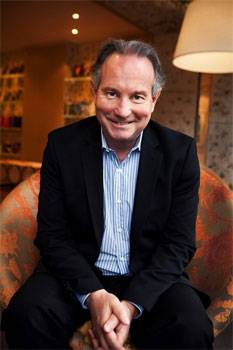Dr Ross Walker CoQ10 and Ubiquinol Interview

How does CoQ10 and Ubiquinol help the body?
Mitochondrial research is the new frontier in biomedical possibilities with tons of research being done on the effects of Ubiquinol and CoQ10. Mitochondrial cells are known to play a role in many diseases of aging and also with energy production that play an important role in performance when exercising.
Humans need massive amounts of cellular energy to function at optimal levels. Strenuous exercise produces strain on the body because of its high energy and physical demands which increases the creation of free radicals. Part of Ubiquinol's role in heart health is based on it playing such a vital role in providing the cellular energy needed to power the heart.
Interview with Dr Ross Walker, Expert Cardioliogist
Dr Ross Walker is a leading Sydney Cardiologist based in Lindfield who specialises in stress echocardiography and preventative cardiology. Dr Walker also introduced coronary calcium scoring into Australia in 1999 in conjunction with the Sydney Adventist Hospital, has published 7 best-selling books on preventative cardiology and lectures both nationally and internationally on this subject.
Question: How does CoQ10 and Ubiquinol help the body?
Dr Ross Walker: CoQ10 is essential for the optimum production of cellular energy. It enhances stamina and improves the body's overall state of health. As a powerful antioxidant, it also prevents lipid peroxyl radicals production, strengthens the immune system and fosters resistance to disease.
COQ10 is a fat-soluble, vitamin-like compound produced naturally by our bodies. Found in nearly every cell in the body, CoQ10 is concentrated in organs that require the most energy " such as the heart, liver, muscles and kidneys.
Ubiquinol is the active form of CoQ10 (Coenzyme Q10) which has been reduced to make it more easily usable by your body. It is one of the most powerful fat-soluble antioxidants in the body.
Question: Why is CoQ10 a super powerful antioxidant?
Dr Ross Walker: Coenzyme Q10 (CoQ10) is a nutrient or coenzyme found in every cell of the body. It plays the vital role of providing cellular energy enabling organs to perform at their best, and protecting cells and blood lipid from oxidation.
There are two forms of CoQ10:
1. Ubiquinone – the inactive form
2. Ubiquinol – the active form
Ubiquinol is the purest, or synthesized, form of CoQ10. Produced naturally within the body, CoQ10 is concentrated in organs that require the most energy " such as the heart, liver, muscles and kidneys. Ubiquinol is CoQ10 that has been reduced to make it more readily usable by the body.
It is also one of the most powerful known fat-soluble antioxidants available, providing support against damage caused by oxidative stress and free radicals.
Question: What does CoQ10 do for our bodies?
Dr Ross Walker: The great news is that CoQ10 has the plethora of scientific data in human trials to support its vast benefits in areas such as cardiovascular disease, ageing, low energy, poor immune function and athletic performance.
Over 1000 studies support the role of CoQ10 as a pillar in the fight against age-related issues, supporting energy production and antioxidant activity essential for optimal health.
Oxidative stress increases with age. As we age, our body converts less CoQ10 to Ubiquinol, thereby reducing essential antioxidant protection.
Supplementing with stabilised active Ubiquinol may be helpful in balancing oxidative stress, helping to protect cells from free radical damage and helping to neutralize 'bad" LDL cholesterol.
CoQ10 has also been reported to have a beneficial effect on symptoms and overall outcome in a number of mitochondrial disorders.
Other mitochondrial disorders like Alzheimer's, Parkinson's and Huntington's disease are now being supported through CoQ10 supplementation with some promising results.
Question: How can we get CoQ10?
Dr Ross Walker: As we age, the concentration of Ubiquinol in the body decreases year by year, indicating that it has a close relationship with ageing.
Ubiquinol's role is to extract energy from food and assist in powering the body's overall energy levels as well as supporting the health of our major organs. Science shows that as we age or put our bodies under stress our Ubiquinol levels decline often leaving us feeling fatigued and lacking in energy.
Although Ubiquinol is found in food such as spinach, red meat, peanuts and chicken, you need to eat a large quantity of these foods to get the required dose so with that in mind your practitioner may recommend supplementation.
Due to Ubiquinol's superior absorption ability, you can take a lower dose for the same effect.
Question: What are the ten essential nutrients for energy?
Dr Ross Walker: 1. Ubiquinol
2. Iron
3. B Complex Vitamins
4. Iodine
5. Zinc
6. Omega 3s
7. Magnesium
8. Vitamin D
9. Vitamin C
10. Acetyl L-Carnitine
Question: Can CoQ10 maximise peak performance when we train?
Dr Ross Walker: As we burn energy with physical activity, our body releases free radicals that have the potential to interfere with the normal functioning of our body. Studies have shown that increased production of free radicals in the body may accelerate health conditions by interfering with the normal functioning of body tissues. Therefore, it is important to look after your body during (and in between) exercise for optimal health.
Often we compensate for a lack of exercise one day by over-exerting ourselves on another, placing strain on our bodies which may result in a decline of CoQ10.
In a double-blind placebo controlled study of 100 young German Olympic athletes (Journal of Sports Nutrition, 2013), scientists revealed that athletes supplementing with Ubiquinol showed a 2.5% improvement of physical performance, which equates to about a 1km distance when running a marathon. After six weeks of training, the athletes who received Ubiquinol demonstrated higher levels of muscle power compared to those who did not.
Interview by Brooke Hunter
MORE





